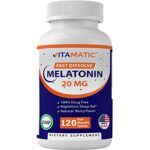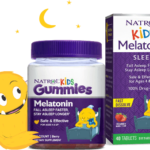Can You Get High Off Melatonin?

Euphoria, commonly known as a “high” is a feeling or state of intense excitement and happiness, it is an amplification of pleasure, a phase where one’s essential biological needs appear to be satisfied.
Euphoria is associated with many classes of addictive drugs and it is linked with the brain reward system. Drugs of abuse have in common the fact that they serve as biological rewards. They do so because of their ability to activate endogenous brain circuitry.
Drugs that cause euphoria activate the brain’s reward center by triggering the release of the brain chemical dopamine which surges, like waves producing high in the process. After repeated hits, the brain adjusts to this higher level of dopamine by making less of it and by reducing the number of receptors that can receive and transmit the signals it sends.
Having too much dopamine or too much dopamine concentrated in some parts of the brain and not enough in other parts is linked to being more competitive, aggressive, and having poor impulse control. It can lead to conditions that include ADHD, binge eating, addiction, and gambling.
What is Melatonin?
Melatonin is a hormone in your body that plays a role in sleep. Your body produces melatonin naturally. It doesn’t make you sleep, but as melatonin levels rise in the evening, it puts you into a state of quiet wakefulness that helps promote sleep. Most people’s bodies produce enough melatonin for sleep on their own. However, there are steps you can take to make the most of your natural melatonin production, or you can try a supplement on a short-term basis if you’re experiencing insomnia, want to overcome jet lag, or are a night owl who needs to get to bed earlier and wake up earlier, such as for work or school. Melatonin production declines with age.
Melatonin is also available as a supplement, typically as an oral tablet or capsule. Most melatonin supplements are made in a lab. People commonly use melatonin for sleep disorders, such as insomnia and jet lag. Melatonin sleep aids are growing in popularity, with 3 million Americans using them in 2012, according to a nationwide survey from the Centers for Disease Control and Prevention.
How Much Melatonin Should I Take?
It’s best to start with the lowest recommended dosage of melatonin for your age. From there, you can gradually increase your dosage until you find a dose that helps you fall asleep without causing any side effects. A safe starting dose for adults is between 0.5 milligram and 5 milligrams of melatonin. Older adults may find lower doses, starting with 0.1 milligram, to be safe and effective. Children should not take melatonin unless recommended by a doctor.
Over-the-counter melatonin may come in standard amounts like 1 milligram, 3 milligrams, or 5 milligrams. You can use a pill-cutter to cut the tablets in half or quarters to create a smaller starting dose.
When Should I Take Melatonin?
The best time to take melatonin is about one hour before your bedtime. Your brain naturally increases melatonin production about one hour to two hours before you sleep, so taking melatonin at this time may help facilitate the process. Melatonin can be effective in relieving jet lag for people who travel across two or more time zones. Adults may take a dose of 0.5 milligram to 5 milligrams one hour before bed for up to four nights after arriving at their destination.
Can You Get High Off Melatonin?
Yes, anecdotal evidence and reports suggest that Melatonin can cause euphoria in some people. There have been reports of people who took melatonin for the first time getting tired, euphoric, and calm after about an hour of taking the drug.
However, there are no published studies that indicate that melatonin is addictive, could get you high, or cause hallucinations. Nevertheless, studies reveal that taking high doses of melatonin can cause vivid dreams during sleep.
It is important to note that just because a supplement is unlikely to be lethal, that does not mean that unwanted or troubling side effects cannot occur. Concerning symptoms have been reported with higher doses of melatonin.
Possible symptoms of too much melatonin include:
Headache
- Hypotension (low blood pressure)
- Hypertension (high blood pressure)
- Drowsiness
- Vomiting
- Worsening of alopecia areata (an autoimmune disorder causing hair loss).
Because melatonin can affect the cardiovascular, dermatologic, and central nervous systems, those with other conditions may be vulnerable to additional risks. Evidence suggests that melatonin supplementation may induce depression, particularly in people predisposed to or currently experiencing this malady. Research on this topic, however, is conflicting, since some studies have demonstrated the potential for melatonin to treat depression.
People taking blood thinners, like warfarin, and benzodiazepines should be careful, as there is a possibility for interaction. Those with epilepsy should also exercise caution, as melatonin has been associated with increased seizures.
Research suggests that elderly people, who have lower natural levels of melatonin, may be more sensitive to the effects of melatonin supplements. Therefore, older people are encouraged to check with their doctor before taking melatonin and start with the lowest possible dose.
You can find useful information on Can You Take Expired Melatonin?





